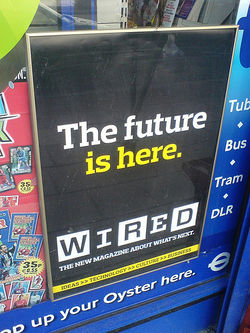Introduction
| Scenario planning for educators | |
|---|---|
| Create your own scenario | Introduction and objectives | Video signpost - Tony Bates | e-Learning activity - Newspaper article of the future | FAQs |
| “ | Dwelling on the past only blinds you to the future. | ” |
| —Andrew Boyd[1] | ||
In this session, participants will engage in the creative process of generating and sharing their own scenario on the future of education based on their research and interactions during this Scenario Planning for Educators workshop.
Scenario planning is a creative process. There is no one right way to develop scenarios but there are a few guidelines to keep in mind when generating your own scenario(s), for example:
- Avoid drafting a scenario depicting the most probable or inevitable future. The idea is to keep an open mind to possible futures.
- When creating multiple scenarios, avoid authoring a clear "favourite" -- scenario alternatives should generate equally compelling narratives of alternative futures.
- Avoid using a high-road versus low-road approach. Most readers would gravitate towards a positive outlook of the future diminishing the value of the low-road alternative for decision-making purposes. However, in some contexts, it may be necessary and appropriate to depict the low-road alternative, for instance, to highlight the associated risks of indecision about the future.
- Scenarios should be plausible avoiding fanciful speculation so its important to pay attention to the internal logic of the scenario.
- Above all, have fun thinking about the future and share your ideas and experiences with fellow participants using microblog posts and comments on participants' blogs.
After completing this session you will have:
|
Microblog post
| Microblog post depicting headlines of major events
Scenarios are usually generated to provide a long term view of the future on the 10 to 20 year horizon. As you think about a possible storyline for your own scenario, it is useful to think about the imaginary headlines that would document major events on the timeline of your scenario. We invite participants to brainstorm the newspaper headlines that they would anticipate reading as their scenarios unfold, for example: "Public university announces closure" or "School launches new ....". Post one or two headlines which depict a major event you could incorporate into your scenario storyline on twitter or WEnotes. Remember to include the hastag "#SP4Ed" in your post. As we are posting publicly, be sensitive to using real names or provide a clear indication of the factitious nature of the post, for example:
|
